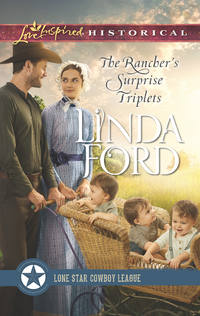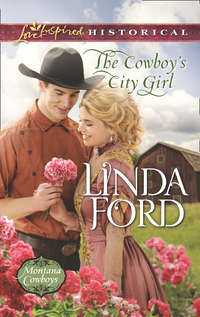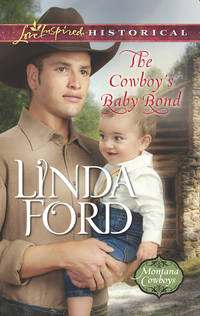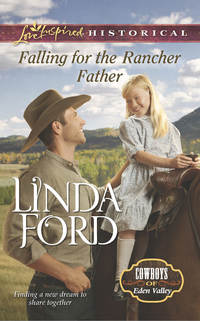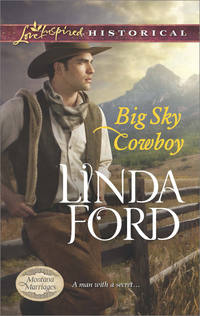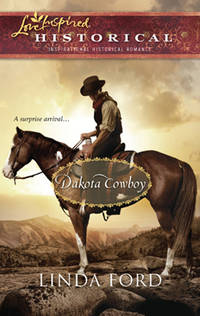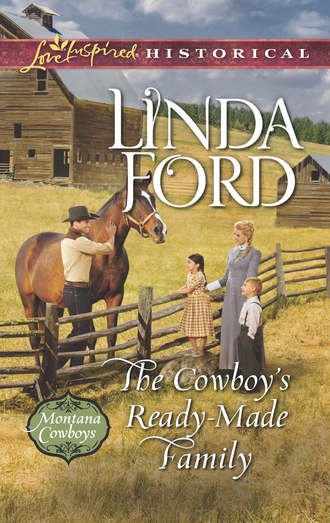
Полная версия
The Cowboy's Ready-Made Family
She wished he hadn’t reminded her of the situation. Her nerves twitched. Accepting help equaled obligation and losing the freedom to make her own choices. It allowed someone to demand something in return. Something she couldn’t or didn’t want to give.
Now was the time to insist on boundaries around the children. But before she could speak, he opened the gate and ushered her through. “Show me what you want.” He crossed his arms and waited.
She’d have that discussion later, after the garden had been worked. The children and their needs must come first.
She’d walked as far as the fence several times, planning how to plant the garden if she ever got the ground tilled. She’d even started digging it with a spade but made little progress. The garden spot had seemed as big as the oat field when she’d turned over one clod at a time. She’d not refuse his help if it meant providing for the children.
“If you wouldn’t mind, you can plow the entire area and run the rows this way.” She indicated the direction with a wave of her hand.
“It will be ready in a couple of hours. You go prepare your seeds while I take care of it.”
She hustled back to the house as her inner war continued. Her vows, her fear and caution against the pressing needs of the farm.
Her throat burned knowing she had little choice but to accept his help. But she would not be obligated. Somehow she had to make that clear to him.
She lifted the cellar lid and climbed down the ladder to get the box of seeds she’d stored there, and brought them up. In addition, for weeks she’d been saving the eyes from the potatoes as she peeled them and storing them in a bucket.
She fairly danced as she organized the lot. The garden would be planted today. With God’s good blessing she would have food to feed the children through the winter.
She wanted to monitor Tanner’s progress without appearing to be watching him, so she took the seeds to the edge of the garden.
He followed after the horse and plow, the reins loose in his hands. Pat appeared happy to be working, plodding along at a moderate pace. Did horses express emotions? Tanner grinned and waved. Seemed he was happy, too.
The idea should put her at ease, but it had quite the opposite effect.
Aunt Ada would act as if she enjoyed something only to turn on Susanne with sudden criticism and harshness, stealing away any idea that her aunt had been pleased in the least.
Susanne hurried away to get a hoe, a rake, twine and stakes.
When she returned, Tanner had his back to her as he plowed the other direction and she felt free to watch. There was something about his posture that suggested he was relaxed. Could it be true that he enjoyed this task? Would that make him less demanding of repayment? He was using the corrals. Would that be enough?
He finished plowing the garden and guided Pat back to the yard.
Susanne grabbed the rake intending to smooth the furrows.
“No need to do that,” Tanner said. “I’ll be right back.” He drove the horse to the barn and unhooked the plow, then backed Pat to another implement. In minutes he drove the horse across the yard dragging harrows that lifted a cloud of dust in their wake.
“I didn’t even know they were in there,” she said.
“They were kind of buried in the grass.” He returned to the garden. The children chased after the harrows. They’d soon be dirty from head to toe, but she didn’t have the heart to call them away. They were enjoying themselves far too much.
Tanner glanced over his shoulder, saw them playing in the dirt and laughed. He turned to Susanne and called, “There’s nothing sweeter than the smell of freshly turned soil.” His smile faded. “Except maybe the smell of sage and pine.” He looked at the mountains for a moment before he returned his attention to the garden.
She leaned on the garden fence. If only she could enjoy watching the land being prepared for planting, but it was impossible. Her gaze drifted again and again to the man doing the work. His muscles bulged beneath the fabric of his shirt, emphasizing his strength. He stopped, wiped his brow with a handkerchief and rolled his sleeves to his elbows, exposing bronze skin the color of an old penny. Jim had told her the Harding boys’ mother had been a full-blooded Indian. She knew only fragments of the story. Just enough to know the woman had been injured and rescued by Tanner’s father. It seemed very romantic and caring.
Which meant nothing in the scheme of things. All that mattered to her was providing for and protecting these children. And her own heart.
Tanner turned the horse and harrows around and faced her. Their gazes caught. She couldn’t pull from his look. Couldn’t draw breath. Couldn’t make her brain work. The children played, their happy sounds but a melody in the background.
He tipped his head slightly and drove the horse from the garden.
She breathed again and sagged against the fence, feeling as if her protective walls had been threatened.
His footsteps thudded across the yard and she jerked to attention and gathered up the twine, but before she could pick up the stakes, he did. He reached for the twine and she relinquished it without a thought.
Sucking in a deep breath, she told herself to refuse his help. But, while she gathered her thoughts, he trotted to the garden and drove the stake in on one end, affixed the twine and hurried down the length to drive in the second stake, pulling the line taut.
He returned and picked up the hoe.
He meant to help plant the garden.
“You don’t have to do this. I can manage.”
He stopped. The air stilled and the children grew quiet. “Do you object?” Something in his voice made her pause and consider her answer. It wasn’t exactly fear she heard; she was quite certain Tanner would never admit fear. Did he think she objected on the basis of his mixed heritage? She’d already informed him it was the least of her concerns.
As she’d often said, actions proved one’s words.
She had to prove her words by her actions, as well.
“I have no objection.” She tried unsuccessfully to quell the turmoil in her heart.
She prayed she wouldn’t live to regret this arrangement.
Chapter Four
Tanner’s muscles had turned to stone. He’d waited for her response, and when she said she had no objection he relaxed so suddenly he welcomed the hoe to lean on. He’d sensed her apprehension all day. Part of him wanted to assure her she had nothing to fear from him. A larger part knew he should walk away from this family before anyone could take exception to his presence on the farm of an unmarried white woman. Two things kept him from leaving. First, the desperate need of this family. And, to a lesser degree, his plan to tame the horses.
Ma would have approved of him helping this family.
What would Seena Harding have said if she’d seen the way he stared at Susanne as he paused at the end of the garden with Pat’s reins slack in his hands? Maybe she could have explained to him why the whole world had ground to a halt as their looks went on and on.
He gave a little snort that he hoped sounded like he might be dislodging something caught in the back of his throat. Like maybe dust or fluff off the weeds. Who’d have thought plowing a garden could confuse a man so thoroughly? Then he finally spoke.
“What are you going to plant?”
“I’m going to plant peas and beans and potatoes and carrots over here. And over there lettuce and radishes and chard. And turnips.” She laughed as if the idea pleased her immensely. The look she gave him about turned him to mush.
What was wrong with him? He’d never felt this way before in his entire life. Well, except for the time that Rosneau girl had batted her eyes at him when they were both about fifteen. Right before her father had grabbed his daughter, pushing her behind him and saying, “You stay away from the likes of him.” Tanner should have understood how unwelcome he was at that point, but he’d persisted until both Jenny and Mr. Rosneau had made it abundantly clear with more than words.
At the reminder of that humiliation, he pulled his senses back where they belonged—in his head. “No beets?”
“Oh, yeah. Beets, too.”
“Sounds fine. What are you starting with?”
“Peas. Lots of peas.”
He dug a trench along the taut cord and she followed, bent over at the waist as she dropped pea seeds in the trench.
“Can we help?” Liz asked. Her brothers and sister stood behind her waiting for his answer.
“You certainly can.” He moved the twine and dug another trench. He got pea seeds and gave some to each of the children, set them at various places along the row and showed them how to carefully drop in the seeds. They all bent over, intent on the task.
He lifted his eyes to see Susanne watching him.
Her gaze shifted to the children and her expression hardened.
He tried to think what it meant, but he could only find confusion in his thoughts. She’d agreed to let him help, but he sensed a reluctance in her. Because of who he was? Or rather what he was?
Seeing she had almost reached the end of her row, he moved the string and dug another trench. The whole time he avoided looking directly at her, trying to keep his thoughts in order.
He quickly filled in her row, checked the children’s row and covered it, as well.
Susanne straightened to look at what she’d completed, but when she took a step backward, she stumbled on a lump of dirt and fell on her rump. Her breath whooshed from her.
He dropped his hoe, prepared to run to her rescue, but he forced his feet to remain where they were. Not everyone would welcome a hand up from a half-breed.
Her burst of laughter froze him to the spot.
She jumped to her feet, dusted her skirts and laughed again. “That will teach me to watch where I’m going.”
The children clustered about her.
“Are you okay?” Liz asked, her voice full of concern.
She gathered them in a group hug. “I’m fine.
Robbie broke free. “Aunt Susanne, show us how to watch where you’re going when you go backward.”
She laughed again. “I can’t show you ’cause I can’t do it.” Her gaze hit Tanner. Her eyes danced with happiness and pleasure in these children, and perhaps in life in general.
He thought he was frozen in place before. Now it threatened to become a permanent state. What would it be like to be part of such joy and acceptance? Then he stopped himself. His family accepted him. It was all he needed.
Susanne looked away, shifting her attention back to the children. “I see you’re done with your row. What shall we plant next?” She led them to the stack of seeds and offered them their choice.
His body remembered how to work and he covered in the rows and moved the stakes.
“They decided on beets,” she declared.
“I like beets,” he said. “You ever make beet pickles? Maisie, that’s my stepmother, makes great beet pickles. They taste mighty fine in the middle of winter. So spicy sweet.” He rattled on like a loose wagon wheel, but he couldn’t seem to stop. It beat staring at her as if he’d lost his senses.
“Auntie Susanne, you ever make beet pickles?” Janie asked. “They sound good.”
“They do, indeed. Maybe Tanner will ask his stepmother to give me her recipe.” She faced him with an expression of horror. “I’m sorry. I should have said Mr. Harding.”
It was his turn to enjoy a laugh. “Think I already said Mr. Harding is my pa, though most people call him Big Sam. I prefer you call me Tanner.”
She nodded, lowered her gaze, then slowly brought it back to his. “I’d be pleased if you’d use my Christian name, as well.”
Little did she know, he already did in his thoughts. “Thank you.”
“Can we call you Tanner?” Robbie asked.
Tanner looked at Susanne, wondering whether she would allow the familiarity. He knew that many folk didn’t approve of children using the Christian names of adults, but on the ranch they’d never held to such rules. “I don’t mind, if it’s okay with you.”
She nodded. “If you aren’t offended.”
“Not in the least. My ma didn’t hold with children and adults being treated differently.”
“Then, yes.” She spoke to the children. “But you must remember to be respectful.”
Suddenly the children were shy and wouldn’t look at him.
Janie giggled. “Tanner is just like us.”
Susanne shook her head, but her eyes brimmed with amusement. “No. He’s an adult.”
“I know.” Janie gave her aunt a look rife with impatience. “’Cause he’s big and strong like my papa.”
The children studied him.
He let them make their assessment. “I’ll never be like your papa. ’Cause no one can ever be like him. Your papa was special to you and always will be.”
Four little heads nodded.
“You ever meet him?” Frank asked. “Papa would have liked you.”
Tanner couldn’t believe the boy’s words. His throat tightened at the suggestion. “I met your pa a few times in town.” It was a fair ways to Granite Creek so trips were infrequent. He tried to recall the few times he’d seen Jim Collins. “I recall last summer he was in town waiting for the stagecoach to arrive. A pretty young lady climbed down and got into his wagon.” By the time he finished he realized that young lady must have been Susanne. Would she be offended at his brash comments? He stole a glance at her, saw her cheeks had grown pink, though he might put that down to the effort of her work.
“A pretty lady?” Janie asked, innocent and curious.
“He means Auntie Susanne,” Liz said.
“I suppose I do. Sorry, ma’am. Didn’t realize until after I’d spoken that I was talking about you.”
“Why are you sorry?” Robbie asked. “She is pretty, isn’t she? I think so.”
“Me, too,” Frank said, and his sisters added their agreement.
Susanne’s cheeks grew pinker by the moment. Tanner should think of a way to change the subject but he could only stare and smile. She certainly was pretty.
What was wrong with his head that he stood here like a dunce thinking about how pretty this white gal was?
How had the conversation led him so far astray? They’d been talking about Jim Collins. His thoughts settled into their proper place.
“I also met your pa a time or two while I was out riding the range. One time he helped me move a bunch of cows that were stranded by a little rock slide in a draw. He didn’t seem to mind pitching in to move the rocks.” He paused, wishing for a way to ease the children’s sense of loss. “He was a good man. Sorry to see him go.”
Frank nodded. “He was a good man.”
Tanner knew he had to distract the children from their grief. “What do you say to getting the rest of this garden in?”
The children eagerly shifted back to the task at hand. As Tanner measured out the next row, Susanne came up to him.
“Thank you for your kind words regarding my brother. They mean a lot to me and the children.”
He slowly brought his gaze to hers, telling himself the whole time that he could look her in the eye without getting all muddled in the head. As soon as their gazes connected, he knew he was wrong.
Something about the way she looked at him made him forget who he was and think only of who he might be...except for his mixed heritage.
“You’re good with the children,” she added when she realized he had nothing to say.
Her comment eased his stubborn mind. “Even though I was young at the time, I remember my ma explaining to one of the cowboys why she allowed her young sons to explore so freely.” At the memory a smile started in his heart. “She said we’d learn best by trying things and seeing if they worked or not. Like the time I tried to rope a bull. I got the rope over his head and he jerked me off the fence. I hung on. I’m not sure what I thought I’d do. The bull dragged me along, bumping across every rock and lump in the ground. But I wouldn’t let go. Might still be there if Pa hadn’t rode up. He grabbed me. Had to pry my hands open to release the rope.” He chuckled.
Susanne looked shocked. “Were you hurt?”
He looked at the palms of his hands as if checking for the rope burns and rubbed his stomach, remembering the bruises. “Nothing serious. You know what I said to Pa?”
“You thanked him for rescuing you?”
“Nope. I said, ‘Guess I won’t do that again.’” He leaned back on his heels, the memory ripe with so many good things. His pa’s concern, his ma’s pride in how hard he tried and the knowledge that they both cared about him in their different ways.
She laughed. “I would hope not.”
They returned to putting seeds in the ground. After the beets, beans and corn were planted, Susanne said, “I’ll have to do the carrot seeds. They need to be sprinkled carefully.”
The children stood to one side, watching. Robbie shoved Frank hard enough to make him fall down. Janie kicked at the dirt sending up puffs of dust.
“Stop doing that!” Liz said.
The children were getting restless. “Let’s do potatoes,” Tanner told them. “They’re fun.”
“Yeah!” Robbie yelled. He ran to the bucket holding the eyes.
“Whoa, there.” Susanne ran after him to save the potato eyes. Her bonnet fell down her back and her brown skirts flicked back and forth with each step. Her laughter filled the air as she caught up to Robbie and swung him off his feet. “What’s your rush?”
Tanner leaned on his hoe and enjoyed the scene.
“Tanner said it was fun.”
She set him down. “And so it shall be.”
Tanner’s inside warmed as he watched the pair laughing together.
Susanne found tin cans for each of the children and divvied the potatoes among them. They returned to his side where he waited with the hoe.
“Wait one minute,” Susanne said, and raced away.
Tanner again admired the view.
“Where’s she going?” Liz demanded.
“I don’t know. I guess we’ll find out when she gets back.” For his part, he was content to watch.
She ducked into the barn and he heard a clatter come from inside. Had she fallen over some of the farm implements strewn about? He started to toss the hoe aside so he could go after her when she marched out, triumphantly carrying another hoe.
“Let’s work in teams,” she said as she reached the garden. “That way the work will go twice as fast. Who wants to be on my team?”
To Tanner’s utter amazement, all four said they wanted to be on his.
Susanne tossed one hand in the air in what he hoped meant surprise. A part of his mind worried she might be offended. “You’re going to make me plant by myself? Does that seem fair?”
“I’ll help you,” Liz said, and went to her aunt’s side.
Tanner edged backward. He had no desire to come between Susanne and her charges. But perhaps he could offer a solution. “Tell you what.” He addressed the children. “We’ll make teams and plant one row then make new teams for the next row. Agreed?”
They nodded.
“Liz and Robbie are on your aunt’s team for the first row. Frank and Janie are on mine.”
The children sorted themselves out and got into place at the end of the first two rows. Susanne and her team beside Tanner and his team.
He tried not to be aware of her. Not to feel her elbow bump him. Not to want to close his eyes and breathe in her presence. He cleared his throat. “Ready?”
“Yes!” they chorused.
He secretly smiled at Susanne’s eager participation.
“On your mark. Get set. Go.” He dug a hole, one of the children dropped in an eye. He scooped the dirt over it. He dug another hole. The other child dropped in an eye and Tanner covered it. Beside him, Susanne did the same thing. He kept himself to a slow, steady pace so they worked side by side.
They reached the end and turned about. Liz and Frank traded places and they planted two more rows. At the end, Janie and Robbie traded places.
All too soon they were done and the six of them stood back and admired their work. He wouldn’t mind staying there the rest of the afternoon, but that was impossible.
“What’s next?” he asked.
“Just lettuce and small stuff. I’ll finish up. I want to plant some flowers, too.” Her voice grew dreamy.
He stole a look at her. She looked at the garden, a slight smile on her lips as if she saw it in full bloom.
She held out her hands to draw the children close. “Let’s thank God for the garden and ask Him to bless it.” She raised her eyebrows as she looked at Tanner.
He shook his head and backed up. “This is your garden.”
She seemed to understand and, with the children clustered about her, she bowed her head. The children followed her example.
He snatched his hat off, at the same time smiling at how Janie held her hands together in prayer.
“Dear Heavenly Father,” Susanne said in a reverent yet trusting tone. “Thank You that our garden is planted. Bless it with rain and sunshine. Provide us with food from the ground. Thank You that You hear our prayers and always, always meet our needs and take care of us. Amen.”
For a moment they remained huddled together, then the children ran to play.
He didn’t put his hat back on, feeling as if he stood on holy ground.
She faced him, a gentle smile on her lips. “Thank you,” she said. “I’ve been worried about the garden since the snow melted. I know God will take care of me, provide for our needs, but it’s easier to trust when I see things happening.”
He nodded, not knowing how to respond. Then words escaped him. “It’s difficult to trust when you can’t see God or know if He’s listening.”
Her eyes widened. “He’s always listening. He’s always near. We have His promise and I have but to look about to see His presence in all that He’s created.”
Tanner needed proof in this aspect of his life as he did in every aspect. When he didn’t respond she smiled though her eyes remained guarded.
“Anyway, thanks again for your help. You made it fun for the children.”
“It’s the way I was raised. Maisie always says there’s no point in looking at work as drudgery when it can as easily be joyful.” He had to clear up something that lingered at the back of his mind. “I hope you weren’t upset because the children all wanted to be on my team.” He had no desire to earn her disfavor. On the heels of that thought came another so foreign it was surely a mistake. He’d enjoyed working with her and had allowed himself to believe she didn’t mind working with him. He knew it couldn’t be so. He’d known most of his life both on the ranch and off that he was neither white nor Indian. Some of the cowboys called him injun and tormented him. Or at least they had until Tanner got strong enough they feared crossing him.
In town—well, he wasn’t going to dwell on the many times he’d been shunned at a social event or young ladies refused to sit by him or even crossed the street to avoid him.
It was enough to enjoy one sunny afternoon when he didn’t feel that disapproval. He wasn’t in a hurry to end it, but he must before she did.
He moved away six feet, paused to speak his piece. “Tomorrow I’ll return to take care of plowing the field for the crop. I won’t bother you again.”
* * *
Susanne stared after him as he rode from the yard. It seemed he couldn’t wait to get away. Her cheeks warmed. Had she said too much? Given him reason to think she expected him to be ready and willing to take care of chores other than the crop? But she wanted nothing from him other than the fulfillment of their agreement.
She returned to the garden, planted a patch of lettuce and then marked out several round areas for flowers next to the fence so she could enjoy them from the kitchen window.
Maybe Tanner had a young lady he was interested in. That would explain his eagerness to let Susanne know he would be avoiding her. The young lady should consider herself fortunate. Tanner would certainly make a good husband and father if the way he’d acted this afternoon was any indication.
She’d enjoyed the afternoon, perhaps more than she had a right to. But the lessons learned from Aunt Ada had not been in vain. Every pleasant moment ended poorly, so she wasn’t surprised that Tanner had suddenly withdrawn and made it clear he wanted to avoid her in the future. However, she would not let it ruin her day. Another Aunt Ada lesson.


